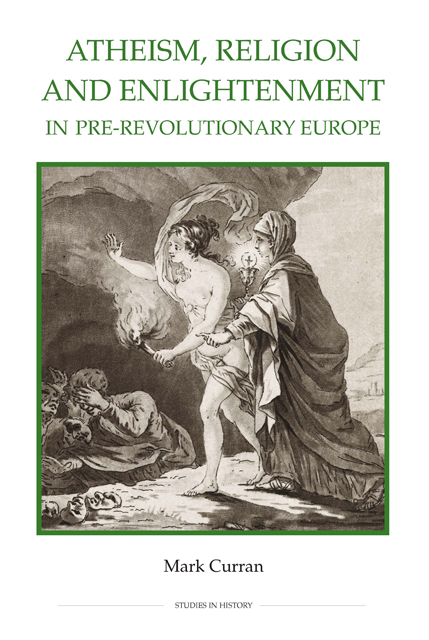Book contents
- Frontmatter
- Contents
- List of figures
- Acknowledgements
- Abbreviations
- Prologue
- Introduction
- 1 The virtuous atheist
- 2 The oral and written public sphere
- 3 Books and pamphlets
- 4 Periodicals
- 5 The philosophe response
- 6 Institutional reactions in France
- 7 The Christian Enlightenment?
- 8 Beyond the Christian Enlightenment
- Appendices
- Bibliography
- Index
8 - Beyond the Christian Enlightenment
Published online by Cambridge University Press: 14 February 2023
- Frontmatter
- Contents
- List of figures
- Acknowledgements
- Abbreviations
- Prologue
- Introduction
- 1 The virtuous atheist
- 2 The oral and written public sphere
- 3 Books and pamphlets
- 4 Periodicals
- 5 The philosophe response
- 6 Institutional reactions in France
- 7 The Christian Enlightenment?
- 8 Beyond the Christian Enlightenment
- Appendices
- Bibliography
- Index
Summary
Despite mounting evidence outlining the contours of a remarkable ‘Christian Enlightenment’ in the international francophone public sphere during the final decades of the ancien régime, some suspicion may still linger. To modern eyes, there is something not quite right about the anti-philosophes. Bad novels and reasoned treatises, utilitarianism and moral outrage – their works certainly read like the Enlightenment. Yet, they were unambiguously directed against the Enlightenment’s leading lights and critiqued significant aspects of the contemporary intellectual Zeitgeist. An article published in the Journal historique et littéraire in 1776, in fact copied from the Journal de Berlin, sarcastically insisted that the two surest means of acquiring a brilliant reputation were to compose comic operas and works of irreligion. The latter was preferable and required just seven steps. First, prospective authors should never follow a plan. Second, they might boldly announce any contradictions that spring to mind using indiscriminately chosen scientific terms. Third, when constructing arguments, writers should employ several pages of superfluous words, without necessarily understanding them, and conclude that their point has been demonstrated. Most readers would rather die than doubt their truth. The fourth tip was to add geometrical terms, which always impress people. Fifth, authors should never let the occasion to mock religion pass them by, and should accuse it of all the evil that reigns on the earth. Sixth, the number of hidden atheists in society should be emphasised. Finally, budding authors must understand the importance of the style of their works. Ideally, they should be longwinded, unclear and contrary to the principals of language.
Although it attacked anti-religious writers as vacuous and self-serving, in form, tone and content this article was entirely in tune with contemporary taste. It was a copied paragraph migrating through the periodical press. One can imagine it being read aloud to amused audiences in the coffee houses and watering holes of Berlin and Paris. Its power and effectiveness derived from a soft and impersonal touch – the public could project their own lists of unworthy literary lights who had become famous by confusing and criticising rather than constructing lasting truths. Moreover, it had a rather clever message at its core: that the anti-religious writings of the philosophes disregarded the cornerstone of public sphere discourse – the clear and transparent use of public reason.
- Type
- Chapter
- Information
- Atheism, Religion and Enlightenment in Pre-Revolutionary Europe , pp. 142 - 164Publisher: Boydell & BrewerPrint publication year: 2012



